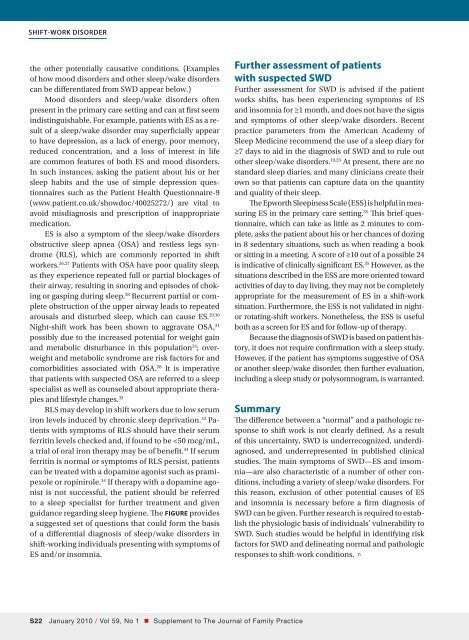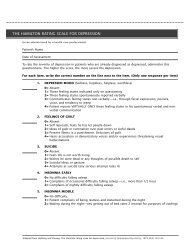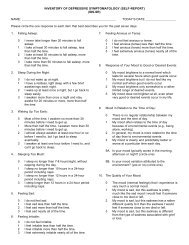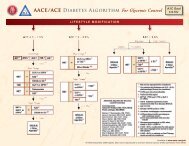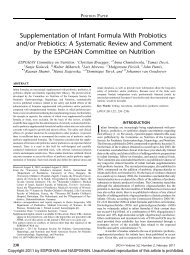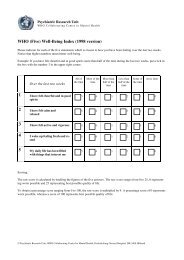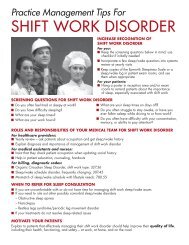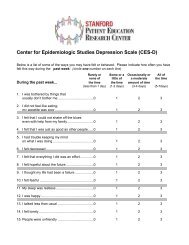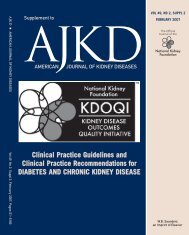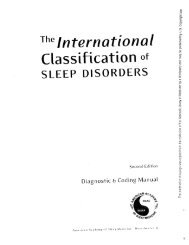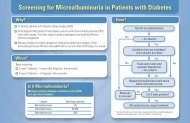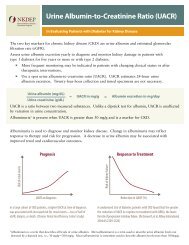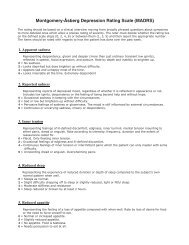Shift-work disorder - myCME.com
Shift-work disorder - myCME.com
Shift-work disorder - myCME.com
You also want an ePaper? Increase the reach of your titles
YUMPU automatically turns print PDFs into web optimized ePapers that Google loves.
<strong>Shift</strong>-<strong>work</strong> <strong>disorder</strong><br />
the other potentially causative conditions. (Examples<br />
of how mood <strong>disorder</strong>s and other sleep/wake <strong>disorder</strong>s<br />
can be differentiated from SWD appear below.)<br />
Mood <strong>disorder</strong>s and sleep/wake <strong>disorder</strong>s often<br />
present in the primary care setting and can at first seem<br />
indistinguishable. For example, patients with ES as a result<br />
of a sleep/wake <strong>disorder</strong> may superficially appear<br />
to have depression, as a lack of energy, poor memory,<br />
reduced concentration, and a loss of interest in life<br />
are <strong>com</strong>mon features of both ES and mood <strong>disorder</strong>s.<br />
In such instances, asking the patient about his or her<br />
sleep habits and the use of simple depression questionnaires<br />
such as the Patient Health Questionnaire-9<br />
(www.patient.co.uk/showdoc/40025272/) are vital to<br />
avoid misdiagnosis and prescription of inappropriate<br />
medication.<br />
ES is also a symptom of the sleep/wake <strong>disorder</strong>s<br />
obstructive sleep apnea (OSA) and restless legs syndrome<br />
(RLS), which are <strong>com</strong>monly reported in shift<br />
<strong>work</strong>ers. 26,27 Patients with OSA have poor quality sleep,<br />
as they experience repeated full or partial blockages of<br />
their airway, resulting in snoring and episodes of choking<br />
or gasping during sleep. 28 Recurrent partial or <strong>com</strong>plete<br />
obstruction of the upper airway leads to repeated<br />
arousals and disturbed sleep, which can cause ES. 29,30<br />
Night-shift <strong>work</strong> has been shown to aggravate OSA, 31<br />
possibly due to the increased potential for weight gain<br />
and metabolic disturbance in this population 24 ; overweight<br />
and metabolic syndrome are risk factors for and<br />
<strong>com</strong>orbidities associated with OSA. 28 It is imperative<br />
that patients with suspected OSA are referred to a sleep<br />
specialist as well as counseled about appropriate therapies<br />
and lifestyle changes. 32<br />
RLS may develop in shift <strong>work</strong>ers due to low serum<br />
iron levels induced by chronic sleep deprivation. 33 Patients<br />
with symptoms of RLS should have their serum<br />
ferritin levels checked and, if found to be


